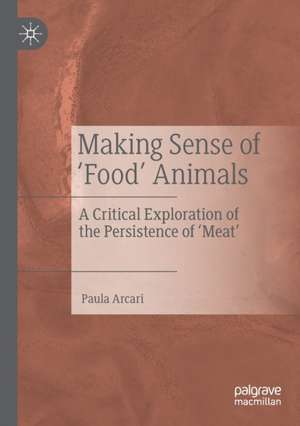Making Sense of ‘Food’ Animals: A Critical Exploration of the Persistence of ‘Meat’
Autor Paula Arcarien Limba Engleză Paperback – 19 sep 2020
| Toate formatele și edițiile | Preț | Express |
|---|---|---|
| Paperback (1) | 389.49 lei 6-8 săpt. | |
| Springer Nature Singapore – 19 sep 2020 | 389.49 lei 6-8 săpt. | |
| Hardback (1) | 505.83 lei 6-8 săpt. | |
| Springer Nature Singapore – 19 sep 2019 | 505.83 lei 6-8 săpt. |
Preț: 389.49 lei
Nou
Puncte Express: 584
Preț estimativ în valută:
74.55€ • 81.01$ • 62.66£
74.55€ • 81.01$ • 62.66£
Carte tipărită la comandă
Livrare economică 21 aprilie-05 mai
Preluare comenzi: 021 569.72.76
Specificații
ISBN-13: 9789811395871
ISBN-10: 981139587X
Pagini: 356
Ilustrații: XIX, 356 p. 4 illus.
Dimensiuni: 148 x 210 mm
Greutate: 0.45 kg
Ediția:1st ed. 2020
Editura: Springer Nature Singapore
Colecția Palgrave Macmillan
Locul publicării:Singapore, Singapore
ISBN-10: 981139587X
Pagini: 356
Ilustrații: XIX, 356 p. 4 illus.
Dimensiuni: 148 x 210 mm
Greutate: 0.45 kg
Ediția:1st ed. 2020
Editura: Springer Nature Singapore
Colecția Palgrave Macmillan
Locul publicării:Singapore, Singapore
Cuprins
Part I.- 1. Introduction.- Part II: Background.- 2. The Problem with ‘food’ animals.- 3. Theoretical Framwork: Advancing and Enacting a Critical Posthumanism.- Part III: Categories and Boundaries.- 4. Animal Categories and the Maintenance of Order.- 5. Negotiating Edibility.- Part IV: The (Dis)Pleasure of Knowing (about Animals & Meat).- 6. Sensory Connections and Emotional Knowledge.- 7. Feelings of Meat.- Part V: The Power of Transparency.- 8. Entitlement.- 9. Visibility: Inviting an Untroubled Gaze.- Part VI: Conclusion.- 10. Undoing Cartographies of Meat.
Notă biografică
Paula Arcari is a Leverhulme Early Career Fellow hosted by Edge Hill University in Lancashire, UK. Seeking to understand the human-animal binary and challenge habitual ways of thinking and acting involving animals, Paula’s current research focuses on the visual consumption of spectacularised animals at zoos, racing events, and agricultural shows.
Textul de pe ultima copertă
This book addresses the persistence of meat consumption and the use of animals as food in spite of significant challenges to their environmental and ethical legitimacy. It identifies what contributes to the persistent edibility of ‘food’ animals, even as this edibility is increasingly critiqued. Beginning with the question of how animals are variously mapped by humans according to their use value, it gradually unpacks the roots of our domination of ‘food’ animals – a domination distinguished by the literal embodiment of the ‘other’. The logics of this embodied domination are approached in three inter-related parts that explore how knowledge, sensory and emotional associations, and visibility work together to render animal’s bodies as edible flesh. The book concludes by exploring how to more effectively challenge the ‘entitled gaze’ that maintains ‘food’ animals as persistently edible.
Caracteristici
Extends beyond individual, rational behaviour-based analyses to look at social constitutions of meat and ‘food’ animals, and the practices they are part of. Offers a unique consideration for the role of the senses and the emotions in (re)constituting practices involving meat and ‘food’ animals. Addresses the increasing visibility of meat production practices, including slaughter, and how these are incorporated into an ethical narrative. Comprehensively addresses the fundamental question of why and how the use of animals as ‘food’ and the consumption of their flesh continues to be understood as normal and natural.
